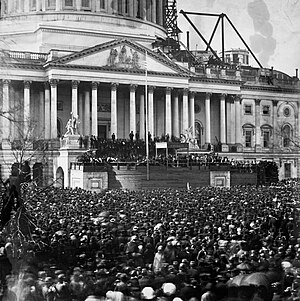
| ||
|---|---|---|
|
Personal Political 16th President of the United States First term Second term Presidential elections Speeches and works
Assassination and legacy  |
||
Abraham Lincoln's first inaugural address was delivered on Monday, March 4, 1861, as part of his taking of the oath of office for his first term as the sixteenth president of the United States. The speech, delivered at the United States Capitol, was primarily addressed to the people of the South and was intended to succinctly state Lincoln's intended policies and desires toward that section, where seven states had seceded from the Union and formed the Confederate States of America.
Written in a spirit of reconciliation toward the seceded states, Lincoln's inaugural address touched on several topics: first, a pledge to "hold, occupy, and possess the property and places belonging to the government"; second, a statement that the Union would not interfere with slavery where it existed; and third, a promise that while he would never be the first to attack, any use of arms against the United States would be regarded as rebellion and met with force. The inauguration took place on the eve of the American Civil War, which began soon after with the Confederate attack on Fort Sumter on April 12.
Lincoln denounced secession as anarchy and said that majority rule had to be balanced by constitutional restraints in the American system of republicanism:
A majority held in restraint by constitutional checks and limitations, and always changing easily, with deliberate changes of popular opinions and sentiments, is the only true sovereign of a free people."[1]
Desperately wishing to avoid a civil war, Lincoln ended with this plea:
I am loath to close. We are not enemies, but friends. We must not be enemies. Though passion may have strained it must not break our bonds of affection. The mystic chords of memory, stretching from every battlefield and patriot grave to every living heart and hearthstone all over this broad land, will yet swell the chorus of the Union, when again touched, as surely they will be, by the better angels of our nature.[2]
- ^ As quoted in Belz, Herman (1998). Abraham Lincoln, Constitutionalism, and Equal Rights in the Civil War Era. Fordham University Press. p. 86. ISBN 978-0-8232-1769-4.
- ^ "First Inaugural Address of Abraham Lincoln". The Avalon Project.

